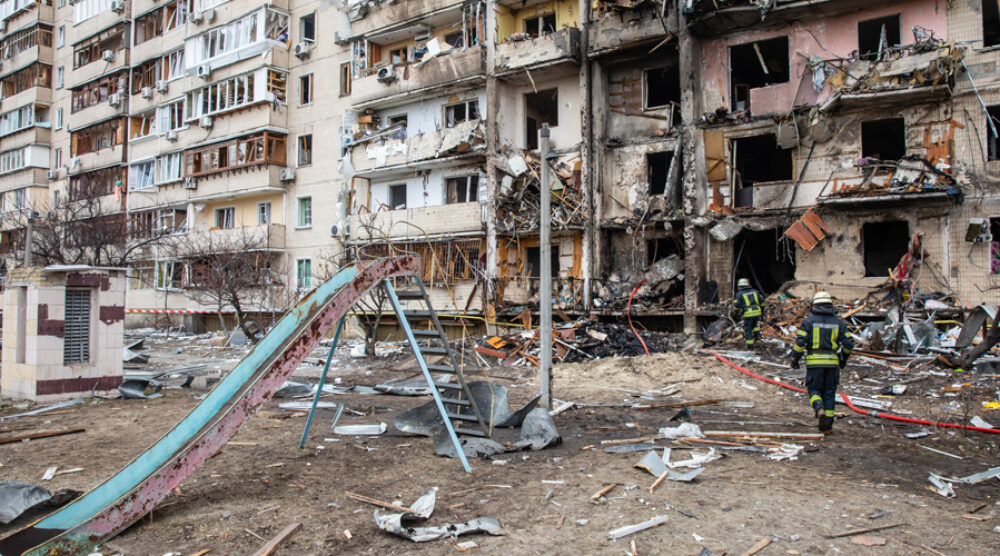ELIZABETH BUCHANAN |
Australia has committed a significant aid package to Ukraine and applied further sanctions against Russia. Though this European security crisis unfolds far beyond the region, Australia’s response aligns with its strategic interests in the Indo-Pacific.
The Russia-Ukraine war has been simmering away since 2014 when Moscow annexed Crimea. Over the past eight years, Kyiv attempted many times to engage Western leaders and draw Western assistance. In response, the West applied sanctions to Russia, seeking to change Kremlin behaviour towards Ukraine.
In many ways, the sanctions approach was “tidy” – it communicated displeasure with the Kremlin and indicated principled support for Ukraine. But this policy is largely about signaling, and one does query the efficacy of sanctions if they fail to shape or change behaviour or are used as a “bandaid” solution to simply signal a political position.
When the Kremlin opted for a policy of full-scale invasion last week, it still elicited a sanctions-centric policy response from the West. Since then, Australia’s Ukraine policy has grown some (inadvertent) teeth via a commitment to $70 million of lethal aid – for NATO to purchase ammunition and small Javelin missiles. Australia has also pledged $35 million dollars of non-lethal aid as humanitarian support to the Ukrainian people. Australia is broadening visa opportunities to Ukrainians wanting to leave the country. Canberra has also strengthened Russian sanctions considerably, targeting oligarchs and politicians, including over 300 members of the Russian parliament.
Australia’s current dual-policy approach of sanctions on Russia and a mix of lethal and non-lethal aid to Ukraine serves the Australian interest in upholding the current liberal rules-based order—an order based on values that align with Canberra’s and from which Australia benefits. The emerging challenge for Canberra is now, of course, that the Indo-Pacific is shaping up to host a different international order and values system. This will curtail future Australian strategy in the region if solely pinned to value-based propositions.
Australia’s neighbourhood is populated by states that refused to sign draft resolutions in the United Nations condemning Russian aggression. This includes all ASEAN states, bar Singapore. When it came time in the UN General Assembly to vote on Russian actions in Ukraine, India, China, Sri Lanka, Pakistan, Vietnam, Bangladesh, and Laos abstained. In the UN Security Council, while Russia vetoed, Indo-Pacific titans China and India have abstained consistently on calls to “deplore” Russian aggression.
Australia’s strategic interests
Largely, Canberra’s interests in Ukraine are tied to the potential knock-on effects of a successful campaign by Russian President Vladimir Putin in Ukraine. While Ukrainian unity has endured for eight years, Australians have largely only gained interest in the past week or so. This has been facilitated primarily by social media and advances in open-source intelligence. Stories of citizens banding together to make Molotov cocktails and communities arming and fiercely resisting Russian troops are impressive.
However, it is early days of the campaign, and ultimately Russia maintains an upper hand when it comes to military capability. Despite the Kremlin’s perplexing current campaign wave, with soldiers running out of food and tanks without fuel, Russian military power can and likely will escalate. In no uncertain terms, Joe Biden has indicated US troops will not set foot in Ukraine, and NATO has reiterated its military commitment is resigned to NATO territory only. So, in the coming weeks or months, maybe years, Ukraine will fight this war on its own.
Consequences for the Indo-Pacific
Could China glean strategic lessons from a protracted conflict in which the US—and the west more broadly—is sidelined? This is a central problem for Australia when it comes to the ripple effects for the Indo-Pacific theatre. There are already some early insights for how the crisis might shape the Indo-Pacific.
European unity, however surprising, might yet allow Washington to somewhat reduce its strategic bandwidth in Europe. Such an opportunity has been presented to the US by Germany’s shock “re-arming” and historical overhaul of its defence identity. In some ways, Ukraine has provided Berlin a chance to make amends for the inherited strategic guilt many of its institutions still carry from World War II. With European security responsibilities shifting back to Europeans and states like Germany, France, and the UK stepping up, Washington can be somewhat freed up for emerging strategic competition in the Indo-Pacific.
The path ahead
While the Ukraine crisis has existed in this current iteration for eight years now, it has taken the events of the past week or so to really rally Australian interest. So, has Australia’s Ukraine policy been successful? Relative to Canberra’s aims, it has. But Australia’s aims are largely value-based and perhaps more virtue signaling than many Australians like to admit. The next conflict or strategic crisis might be much closer to home. Should that be the case, Australia must be ready to do a lot more heavy lifting.
Ultimately, this is a crisis for Ukraine for the Ukrainian people. But it is also a crisis for Russia. The antagonist is the Kremlin and its current leadership, not the Russian people, who are largely devastated by Putin’s actions in Ukraine. Overall, on both sides of this war, it will be the populations that suffer—economically, psychologically, and of course, physically.
Australian policymakers need to take stock of the national position on Russia and Ukraine in terms of Australia’s supply chain security, sovereign defence capabilities, and energy security. This war has already underscored the significance of logistics, and as an island nation, Australia ought to be crafting security strategy-centered principles of national resilience. After all, signaling support for liberal democratic values is quite different to fighting for them. Is Australia ready?
AUTHOR
Dr Elizabeth Buchanan is Lecturer of Strategic Studies at Deakin University for the Defence and Strategic Studies Course at the Australian War College, Fellow of the Modern War Institute at West Point and Adjunct Research Fellow at the Griffith Asia Institute.








